To make Gorilla as accessible as possible at any level of budget, use of the Gorilla software is free and we only charge for access to the data collected. The way we control access to the data collected is via Participant Tokens. You need to purchase one Token for each participant you intend to collect data from. You can find out more about tokens and when they are consumed on our Participant Status and Tokens guide.
One option is to buy tokens at our standard pay-as-you-go rates. However, you can save money by instead purchasing tokens in bulk as an annual subscription. A subscription gives you a set number of tokens for the year which you can assign to your experiments as needed. The page above takes you through the types of subscriptions we offer and how to access and manage them.
We offer different types of subscription - see our pricing page for full details:
For a discount on the standard pay-as-you-go rate, you can purchase an individual researcher subscription. The base package of our researcher subscription includes 1 user and 200 tokens. Add-on token packs are available if you need to top up your token allowance. Your subscription also allows you full access to Gorilla's support services.
This subscription is now called Researcher - Basic subscription. But you can also purchase a Researcher - Standard subscription, which costs a little more, but comes with all three of our new tools (Game Builder, Shop Builder and Multiplayer).
If several people in your lab or team will be using Gorilla, you can further reduce costs by buying a lab subscription! This allows multiple people to have access to the same pool of tokens.
Members of your lab (each with their own Gorilla account) would be added as members of your lab subscription. This would give them the ability to request tokens from the subscription for their own study. Some labs like to work this way to share the tokens between them. You could also do this across several labs. The base package of our lab subscription includes 10 users and 2,000 tokens, with the option to buy additional top-up packages.
This subscription is now called Lab - Basic subscription. But you can also purchase a Lab - Standard subscription, which costs a little more, but comes with all three of our new tools (Game Builder, Shop Builder and Multiplayer). If you are in a commercial team rather than an academic lab, the Team + Success subscription comes with all three of our new tools plus 3 hours of bespoke training.
To learn about renewing your Lab or Team subscription see our Renewals page.
If several research groups or student cohorts want to use Gorilla, then you can reduce costs by buying a department subscription. This is best for departments that want to keep costs down, and are happy to take on some administrative burden. The base package of our department subscription includes unlimited users and 5,000 tokens, with the option to buy additional top-up packages. The Department Standard and the Standard XL subscriptions have unlimited tokens available.
Subscription members can then ask the subscription administrator for tokens, which the administrator can approve. The workflow is built into Gorilla so that this is easy and not time-consuming. The subscription can be set up so that all users on the subscription are automatically entitled to X (e.g. 50) tokens without needing approval. This can work well for universities using Gorilla for undergraduate teaching.
Members of a department subscription can also access Gorilla's Teaching Tools. If your department has a subscription and you would like access to the Teaching Tools, email info@gorilla.sc.
We are able to accept Purchase Orders and issue invoices in advance of purchase for lab and department subscriptions. Email us for more information.
See our Pricing page for more information on our subscriptions.
If you are interested in renewing your Department Subscription, please get in touch with us via subscriptions@gorilla.sc
If you have any questions or want to chat about the best subscription for you, just send us an email at info@gorilla.sc.
You can now purchase subscriptions via the Gorilla website! You'll find the link to do this on your My Account page:
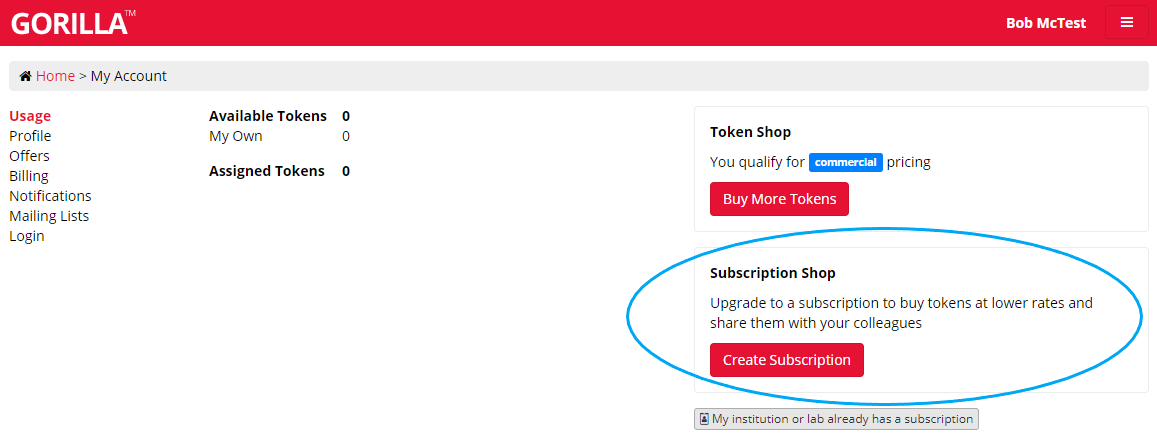
If you'd prefer us to issue you a quote in advance of payment, email us at info@gorilla.sc and we'll be able to organise this for you. If you are buying a Lab or Department subscription, you can also request an invoice in advance of payment by emailing info@gorilla.sc.
To see our subscription pricing, visit our Pricing page.
You can find your subscription status through 'My Account'.
If you are entitled to be added to your department's subscription, you may have already been added. Ordinarily, you will need to sign up to Gorilla using your academic email address in order to be added to your department's subscription. If you do not have an academic email address but still think you should be added to the subscription, contact your Subscription Administrator.
If you have not been added to your department's subscription, and you have been given an enrolment code by your university, you can enter this from 'My Account'. Click the button labelled 'My institution or lab already has a subscription':
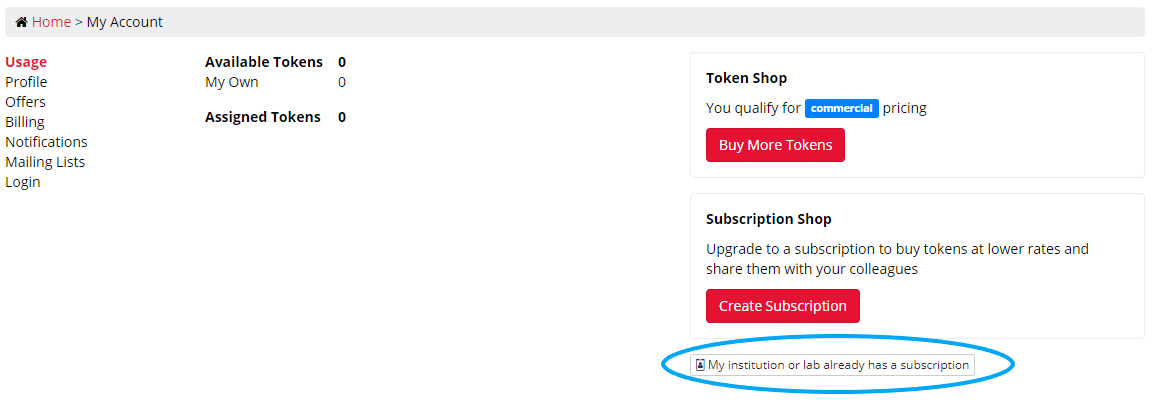
This will open a window where you can enter your enrolment code:
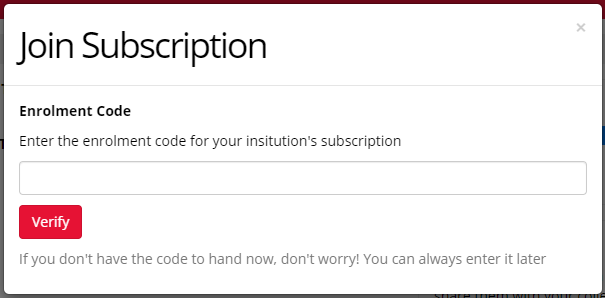
If you have not been added to your department's subscription, and you do not have an enrolment code, please contact your department's subscription administrator, whose details can be found on this list of institutions with subscriptions. If your subscription administrator is not listed, ask internally to your department to find out who they are.
The Subscription Administrator is the person within your department (usually a technician) who has control of who is on the subscription.
They can add and remove people from the subscription at any time. This means that only people authorised to use the subscription benefit from your subscription.
On a metered department subscription, subscription administrators are also able to control token usage through a token request system.
You can find the details of your Subscription Administrator on this list of institutions with subscriptions.
If your institution or administrator's information isn't mentioned in our list of institutions with subscriptions, please ask internally within your department for the contact details of your subscription administrator.
Yes!
If you are the subscription administrator on a Lab subscription, have a look at our guide for subscription administrators (Lab)
If you are the subscription administrator on a Department subscription, have a look at our guide for subscription administrators (Department)
Yes – you can collaborate with any Gorilla user anywhere in the world. And together you can choose whether or not to use tokens from your department subscription.
In Gorilla, only the project owner can change recruitment policies and assign tokens. The project owner is the person who created the project folder in Gorilla. So, if Nick Hodges from Gorilla University adds Jo to a project, the tokens come from Nick (or Gorilla University's subscription). If Jo Evershed from Cauldron Institute adds Nick to one of her projects, the tokens come from Jo (or Cauldron Institute's subscription).
This prevents other researchers from running up a bill for their own projects at your department’s expense!
If you are on a researcher subscription, all the tokens from your subscription will be automatically assigned to you upon purchase. If you are on any other kind of subscription, you will need to request tokens before you can assign your tokens to an experiment.
If you are on a lab subscription, all requests will be approved automatically. Your subscription administrator will be able to see how many tokens you have requested.
If you are on a department subscription, your department will set a limit on the number of tokens that can be granted to each user automatically upon request, and any further requests will have to be approved. Please ask your Subscription Administrator if you want to know the token rules for your subscription.
The Recruitment Tab in the Experiment Builder by clicking Change Recruitment Target and increasing the Recruitment Target (Ns). You will then be asked where to request the tokens from. The appearance of the pop-up window depends on which subscription(s) you are on.
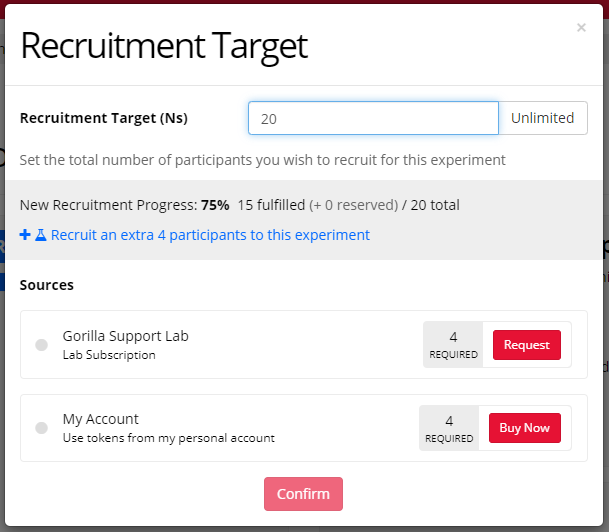
In the example above, we can request from the lab subscription, but we could also decide to buy, and pay for, our own tokens. If you are on an unlimited subscription or if you still have tokens available on your account, these will be marked as green buttons, but the process would be the same to add them to your recruitment target.
If we want to request tokens from the lab subscription, we will get another pop-up window which looks like this:
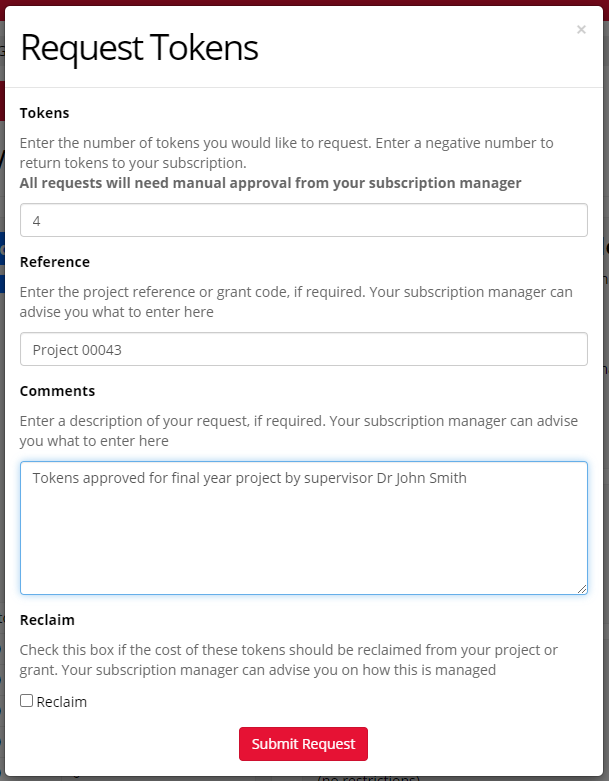
Ask your Subscription Administrator for the details you need to include on this form. The Reference field is designed for project references, grant codes, or any other code which might be used for reporting. The Comments field is a free text box that allows you to explain in more detail about what you need the tokens for.
Depending on your department, you may also see a 'Reviewer' dropdown menu at the top of the Request Tokens window, where you have to select a specific reviewer to handle your request.
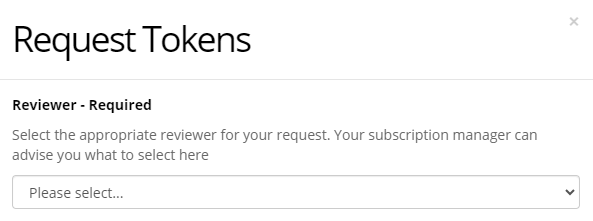
Your department should advise you which reviewer to select. Check with your subscription administrator if you're not sure!
Note: You can also return tokens you already have on your account to your subscription by completing the form exactly as above, but entering a negative number, e.g. -100 . This only applies to tokens that are not assigned to an experiment: if tokens are already assigned to an experiment they will first need to be unassigned, which you can do by reducing the experiment's recruitment target.
For more information on assigning tokens to an experiment, see the Assigning Tokens section of our Pricing FAQ.
Being on several subscriptions is possible and you can see all your subscriptions in the same way as described above. By clicking on 'My Account', you can see subscriptions you are currently member of and go to each one.
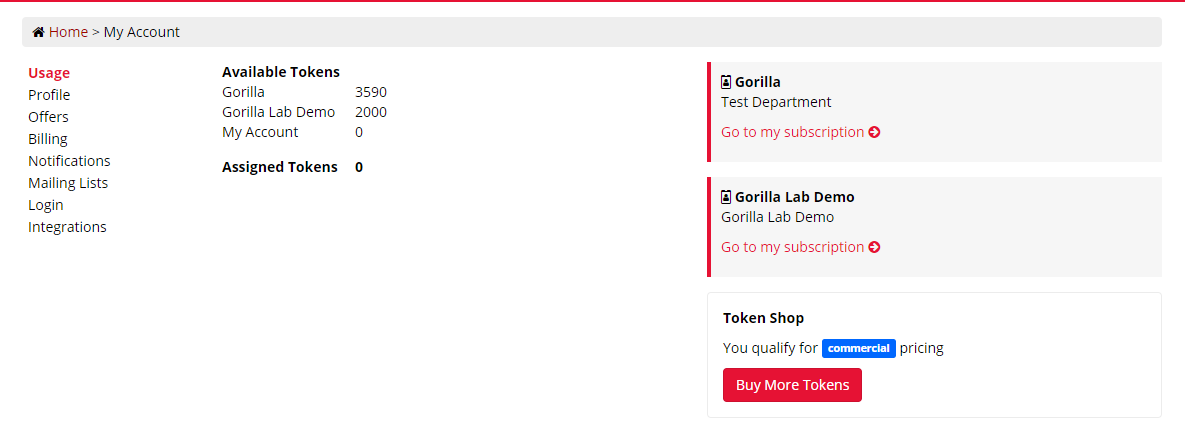
You are then able to request more tokens by choosing a subscription and entering the number of tokens you would like to receive. You can also request tokens directly from within your experiment tree in the Recruitment tab. In that case, you will be able to choose again from which subscription you want to request your tokens (see screenshot below).
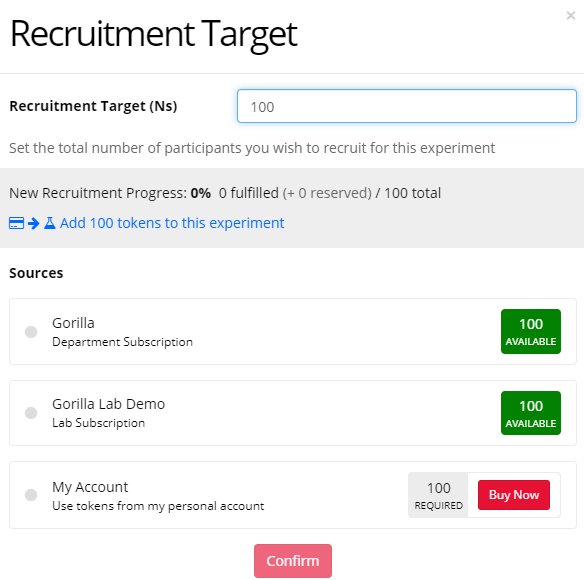
A seat is the same as a user. If you have 10 seats on your subscription, that means you can have up to 10 users accessing your subscription.
If you are looking to transfer the ownership of a project, this can be done automatically using the Support Contact Form. From the dropdown menu, select 'Project Ownership Change Request'.
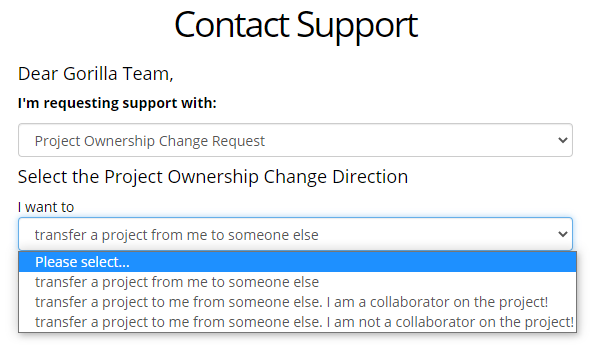
The other party will receive a notification about the requested change via email, which they can also find by going directly to their account notifications. They will need to approve the change request themselves.

Both the requester of the transfer, and the other party, will need to provide a reason for the transfer. In some cases, Gorilla Admin may need to review these requests.
Once the request has been approved by the other party (and, in some cases, Gorilla Admin), both the requester and other party will receive an email notification that the process has been approved. Again, this can be found directly in account notifications.
Please Note: If you are looking to transfer the ownership of multiple projects, you will need to fill in a new request form for each project transfer.
If you leave or simply don't renew your subscription, you will still be able to access all of the data you have included from previous experiments in projects you are the owner of; the access to your data doesn't expire with your subscription. Your account will be working as normal as well, so you are still able to build new experiments.
If you are leaving your university and you are about to lose access to your e-mail address, there are a few things to consider.
If you are allowed to retain access to the data you already have collected, the simplest solution is just to change the email address associated with the account and remove yourself from the subscription (if applicable).
If you are an undergraduate student, this might not be appropriate, as you are usually not allowed to take the data with you when you leave your university. In that case, you can create a personal account, and add yourself as a collaborator from your private account without providing yourself data access. This will allow you to keep access to your tasks, but not the data.
If you want to delete your entire account, have a look at our Due Diligence page.
Universities often have internal due diligence processes that must be followed to allow procurement to proceed. All the information required can be found from this Due Diligence page.